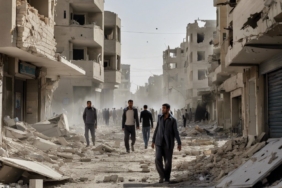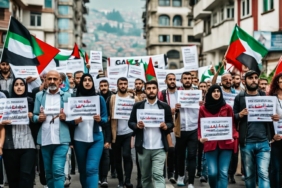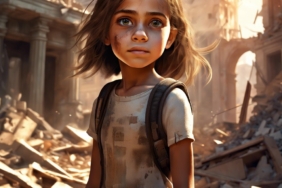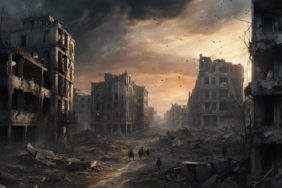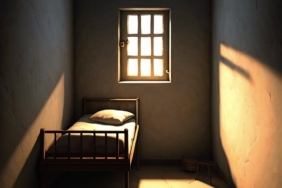Program at Neslişah Sultan Cultural Center
The difficulties faced by journalists and members of the press who lost their lives in Israel’s attacks on Gaza since October 7, 2023 were discussed in a program held at the Neslişah Sultan Cultural Center. In this program, photographs of journalists who lost their lives in Israel’s attacks were exhibited and their life stories were shared with the audience.
The event featured a TRT World production about Rafah, the last refugee of Gazans, ” No Escape: Voices from Rafah“The documentary was screened. The documentary revealed the painful realities of Gaza.
Experiences of Journalist Riwa Aladini
Speaking at the panel, Gazan journalist Riwa Aladini stated that she left Gaza and came to Turkey two months after the Israeli bombardment. Stating that many of her friends did not have this chance, Aladini said, “Maybe they chose to stay there.” Stating that she worked as a freelance journalist for a website during every time in Gaza, Aladini explained her experiences with the following words:
- “In the past two months, we always had a fear of whether we would be able to find food or water to drink at the supermarket.”
- “There was a power outage and internet access was nearly impossible.”
- “It was impossible to even find medicine; it was impossible to find a doctor either. The hospitals had already been bombed and the schools were closed.”
Emphasizing that no place in Gaza is safe, Aladini said, “The moment you walk down the street, the place you are in can suddenly be bombed.”
Journalist Memduh Borno’s Views
Another journalist on the panel, Memduh Borno, said that he had witnessed many wars due to his profession, but had never encountered a situation like what was happening in Gaza recently. Stating that life in Gaza had never been normal since 2006, Borno said, “We got used to this situation and continuing life this way became a way of life for us.” He also said, “Despite this situation imposed on us by Israel, life somehow went on. Sometimes the Rafah border was opened, sometimes it was only open for four days a year.”
Borno emphasized that they had to resist Israel’s attacks and said, “Israel’s intervention in Gaza has little to do with October 7. They were already planning how to reduce the population of 2 million. Their second plan was to completely occupy northern Gaza. They needed “this to reach the gas fields in northern Gaza.” Stating that they aimed to divide Gaza in two, Borno said, “Today is not the time to talk about what we did wrong to Israel. The most important goal for Palestinians should be to stop this massacre.”
Borno emphasized that all of Gaza’s needs must be met, saying, “Palestinians need to act as a unit again. If we cannot establish this unity, we are doomed to lose.”
Targeting of Journalists
Drawing attention to the fact that journalists in Gaza are being targeted by Israel in a planned manner, Borno said, “The biggest target right now is journalists. They are doing this because they do not want our voices to be heard. They are targeting us to prevent us from showing what is happening in Gaza, the massacres and the people being left hungry.”
